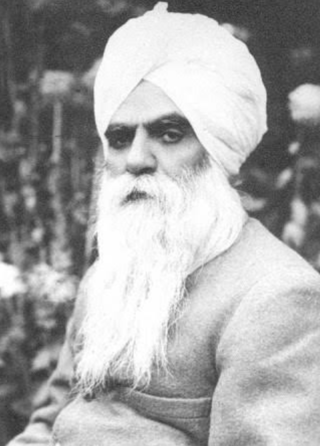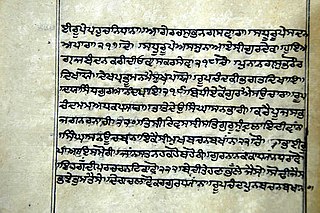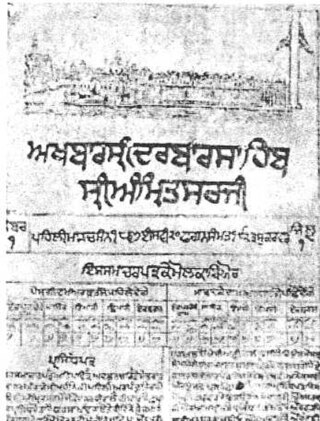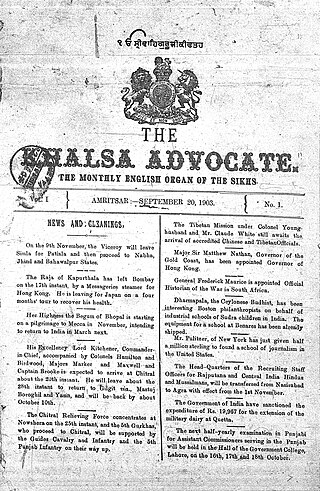
Khalsa refers to both a community that considers Sikhism as its faith, as well as a special group of initiated Sikhs. The Khalsa tradition was initiated in 1699 by the Tenth Guru of Sikhism, Guru Gobind Singh. Its formation was a key event in the history of Sikhism. The founding of Khalsa is celebrated by Sikhs during the festival of Vaisakhi.

Kaur, sometimes spelled as Kour, is a surname or a part of a personal name primarily used by the Sikh and some Hindu women of the Punjab region. It is also sometimes translated as 'lioness', not because this meaning is etymologically derived from the name, but as a parallel to the Sikh male name Singh, which means 'lion'.

Tara Singh was a Sikh political and religious figure in India in the first half of the 20th century. He was instrumental in organising the Shiromani Gurdwara Prabhandak Committee and guiding the Sikhs during the partition of India, which he strongly opposed.
Guru Nanak founded the Sikh religion in the Punjab region of the northern part of the Indian subcontinent in the 15th century and opposed many traditional practices like fasting, Upanayana, idolatry, caste system, ascetism, azan, economic materialism, and gender discrimination.

Vir Singh was an Indian poet, scholar and theologist of the Sikh revival movement, playing an important part in the renewal of Punjabi literary tradition. Singh's contributions were so important and influential that he became canonized as Bhai, an honorific often given to those who could be considered a saint of the Sikh faith.
Jat Sikh or Jatt Sikh is an ethnoreligious group, a subgroup of the Jat people whose traditional religion is Sikhism, originating from the Indian subcontinent. They are one of the dominant communities in the Punjab, India, owing to their large land holdings. They form an estimated 20–25% of the population of the Indian state of Punjab. They form at least half of the Sikh population in Punjab, with some sources estimating them to be about 60–66% appx. two-third of the Sikh population.

The Chief Khalsa Diwan or Chief Khalsa Diwan Charitable Society is a Sikh organisation that is the central organization of various Singh Sabhas spread across Punjab, India. Unlike the Shiromani Gurudwara Prabandhak Committee, the C.K.D. is an apolitical body and only concerns itself with religious, educational and cultural issues. The organization originally controlled Sikh religious and educational concerns and was an advocate of Sikh political rights, though it presently is mostly limited to educational spheres. It was the main council of Sikhs until the birth of more radical organizations, such as the Central Sikh League, the S.G.P.C., and the Akali Dal.

Suraj Prakash, also called Gurpartāp Sūraj Granth, is a popular and monumental hagiographic text about Sikh Gurus written by Kavi Santokh Singh (1787–1843) and published in 1843 CE. It consists of life legends performed by Sikh Gurus and historic Sikhs such as Baba Banda Bahadur in 51,820 verses. Most modern writing on the Sikh Gurus finds its basis from this text.

Kahn Singh Nabha was a Punjabi Sikh scholar, writer, anthologist, lexicographer, and encyclopedist. His most influential work, Mahan Kosh, inspired generations of scholars after him. He also played a role in the Singh Sabha movement.
Punjabi literature, specifically literary works written in the Punjabi language, is characteristic of the historical Punjab of present-day Pakistan and India and the Punjabi diaspora. The Punjabi language is written in several scripts, of which the Shahmukhi and Gurmukhī scripts are the most commonly used in Western Punjab and Eastern Punjab, respectively.

The Khalsa Akhbar, Lahore, was a weekly newspaper and the organ of the Lahore Khalsa Diwan, a Sikh society. Published from Lahore in the Punjabi language, the newspaper was established in 1886 and functioned sporadically till 1905. Founded by Bhai Gurmukh Singh, a professor of Punjabi at the Oriental College, Lahore, who also established the Khalsa Press in Lahore, the paper was taken over by Giani Ditt Singh, a scholar and a poet. It was one of the most prominent and influential Sikh periodicals prior to 1920.

The Singh Sabhā Movement, also known as the Singh Sabhā Lehar, was a Sikh movement that began in Punjab in the 1870s in reaction to the proselytising activities of Christians, Hindu reform movements and Muslims. The movement was founded in an era when the Sikh Empire had been dissolved and annexed by the British, the Khalsa had lost its prestige, and mainstream Sikhs were rapidly converting to other religions. The movement's aims were to "propagate the true Sikh religion and restore Sikhism to its pristine glory; to write and distribute historical and religious books of Sikhs; and to propagate Gurmukhi Punjabi through magazines and media." The movement sought to reform Sikhism and bring back into the Sikh fold the apostates who had converted to other religions; as well as to interest the influential British officials in furthering the Sikh community. At the time of its founding, the Singh Sabha policy was to avoid criticism of other religions and political matters.

Giani Ditt Singh was a historian, scholar, poet, editor and an eminent Singh Sabha reformer. Singh wrote over 70 books on Sikhism, the most famous of which is Khalsa Akhbar. His Dayanand naal mera Samvaad and Durga Parbodh are considered major texts of Sikh philosophy.

Harbans Singh was an educationist, administrator, scholar and the editor-in-chief of the Encyclopaedia of Sikhism. He was respected for his contributions to Sikh scholarship and Punjabi literary studies and had a vital and pervasive influence in the field of religious studies, with special reference to Sikhism.

Balbir Singh born in 1896 at Katra Garba Singh, Amritsar, was a Sikh scholar and brother of Bhai Vir Singh.

Kavi Santokh Singh was a Sikh historian, poet and writer. He was such a prolific writer that the Sikh Reference Library at Darbar Sahib Amritsar was named after him, located within the Mahakavi Santokh Singh Hall. In addition to "Great Poet" (Mahākavī) Santokh Singh was also referred to as the Ferdowsi of Punjabi literature, Ferdowsi wrote ~50,000 verses while Santokh Singh's Suraj Prakash totals ~52,000. Other scholars have thought of Santokh Singh as akin to Vyasa. Gottlieb Wilhelm Leitner in 1883 wrote that, "Santokh Singh of Kantal in the Karnal District, has rendered his name immortal" through the production of his works.

Khalsa Samachar is a Sikh weekly newspaper that was founded in 1899 by Vir Singh. The periodical covers Panthic news, the tenets of the Sikh religion, elucidation of gurbani, and imparting the teachings of Sikhism. It was one of the early Punjabi and Gurmukhi newspapers that left a lasting influence and one of the most influential Sikh newspapers prior to 1920.

The Akhbar Sri Darbar Sahib Sri Amritsar Ji, also known simply as Akhbar Sri Darbar Sahib, was a Braj-language fortnightly newspaper written in Gurmukhi script that was founded in Amritsar in 1867. It was one of the first Gurmukhi and Sikh newspapers.

The Khalsa Advocate was a Sikh newspaper in English founded in 1903 by the Chief Khalsa Diwan. It was one of the most prominent and influential Sikh periodicals prior to 1920.
















